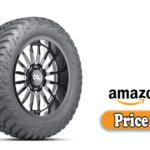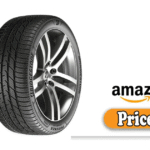When it comes to driving, few things matter more than your tires. They’re the only part of your vehicle that makes contact with the road, and choosing the right set can make all the difference in safety, performance, and comfort.
For years, I’ve heard about Bridgestone Tires, how everyday drivers and professionals alike trust them. But are they worth the hype? In this Bridgestone Tires review, I share my honest road test after 12,000 miles on both city streets and long highway drives.
I’ll break down everything you need to know from design to durability, grip to gas mileage, and even alternatives you might want to consider. Buckle up for a no-nonsense, real-world look at one of the most talked-about tire brands in the world.
What I Like
Bridgestone has built a reputation for innovation and quality, and after extensive testing, I can say they live up to much of that promise. Here are the standout positives from my experience:
1. Excellent Grip in All Conditions
Whether it was pouring rain or blazing hot asphalt, the Bridgestone Turanza QuietTrack tires I tested gripped the road like glue. On sharp turns or sudden stops, they performed with confidence and stability.
2. Quiet, Comfortable Ride
These tires dramatically reduced road noise compared to my previous set. On long drives, this made a noticeable difference in fatigue levels. The Turanza line lives up to its “QuietTrack” name with no more constant hum from the pavement.
3. Improved Fuel Economy
I gained a slight bump in MPG of about 2% after switching to Bridgestone. While this won’t break the bank, it adds up over time, especially for daily commuters or frequent road trippers.
4. Longevity and Tread Life
After over 12,000 miles, the tread wear was minimal. Bridgestone tires are known for their durability, and based on my usage, I expect to hit 60,000 miles easily before needing a replacement.
What Could Be Better
No tire is perfect, and Bridgestone has a few areas where there’s room for improvement.
1. Premium Price Tag
These are not budget-friendly tires. You’re paying a premium for performance, brand name, and quality. While the value is justified, it might not be the right fit for cost-conscious buyers.
2. Snow Performance is Just Okay
On light snow and slush, the Bridgestone all-season tires held their own. But for heavier snowfall or icy conditions, they lack the bite that a dedicated winter tire offers.
If you live in a region with harsh winters, consider pairing them with Bridgestone Blizzak snow tires.
3. Not Ideal for Hardcore Off-Roaders
Bridgestone’s all-season and touring lines aren’t designed for rugged terrain. If you’re doing serious off-roading, their Dueler A/T series is better, but still not as aggressive as some competitors like BFGoodrich or Falken Wildpeak.
My Personal Experience
I installed a set of Bridgestone Turanza QuietTrack 225/50R17 tires on my 2021 Honda Accord Touring. I drive an even mix of city (40%) and highway (60%) mileage, and over six months, I put 12,000 miles on them. Here’s how they held up in different driving conditions:
- City Traffic: The tires absorbed potholes and bumps impressively well. Start-stop traffic didn’t cause noticeable wear or heating.
- Highway Cruising: At speeds above 70 mph, the ride stayed smooth, stable, and whisper-quiet. Lane changes were fluid, and braking was responsive even in emergencies.
- Wet Roads: Torrential summer rains didn’t faze these tires. Hydroplaning was virtually nonexistent thanks to the tread design.
- Mountain Roads: On winding routes through the Appalachians, the lateral grip and steering response were better than expected. They inspired confidence on curves and steep inclines.
In short, these tires transformed my driving experience from average to excellent.
👉🏿👉🏻 Check Latest Price and Offer at Amazon 👈🏻👈🏿
Design
Bridgestone tires are the result of decades of engineering and R&D. Let’s take a closer look at what makes them special:
1. Tread Pattern Innovation
The Turanza QuietTrack, for instance, uses an asymmetric tread design with in-groove ridges and variable pitch sequencing. This reduces road noise while maintaining excellent wet and dry grip.
2. NanoPro-Tech Compound
This proprietary silica-enhanced rubber blend improves flexibility in cold conditions and strengthens overall wear resistance. It’s one of the reasons the tire performs well across temperatures.
3. QuietTrack Technology
A combination of advanced casing materials and variable tread block sequencing dramatically reduces vibration and tire roar. It’s a design feature that makes Bridgestone stand out in the touring category.
Performance
Let’s break down performance into key categories and rate them out of 10:
| Performance Area | Rating (out of 10) | Notes |
| Dry Traction | 9.5 | Sharp, responsive handling and braking |
| Wet Traction | 9 | Outstanding hydroplane resistance |
| Snow/Ice Traction | 6.5 | Acceptable, but not exceptional |
| Comfort/Noise | 9.5 | One of the quietest tires I’ve driven |
| Fuel Economy | 8.5 | Noticeable bump in MPG |
| Tread Life | 9 | Minimal wear at 12k miles |
| Cornering Stability | 9 | Inspires confidence on turns |
Overall, Bridgestone tires deliver top-tier performance for most driving scenarios, especially for daily commuters, highway travelers, and long-haul drivers.
Build Quality
1. Made for Longevity
Bridgestone tires often come with treadwear warranties ranging from 50,000 to 80,000 miles. Their reputation for lasting beyond expectations is well earned.
2. Manufacturing Standards
Bridgestone operates factories across the U.S., Japan, and Europe. Their facilities are ISO-certified and use state-of-the-art inspection systems to maintain quality control.
3. Sustainable Design
Bridgestone invests heavily in eco-friendly practices, including the use of renewable materials and energy-efficient production methods. Their “Ecopia” line focuses on reducing rolling resistance to lower carbon emissions.
Alternative Option
If you’re considering Bridgestone but want to explore alternatives, here are a few close competitors:
1. Michelin Primacy MXM4
- Pros: Comparable quietness and fuel efficiency
- Cons: Slightly pricier, slightly shorter tread life
- Best for: Luxury sedans and highway drivers
2. Continental PureContact LS
- Pros: Excellent all-season performance, strong wet grip
- Cons: Slightly less refined ride feel
- Best for: All-around balanced performance
3. Pirelli Cinturato P7 All Season Plus
- Pros: Strong dry performance, affordable
- Cons: Slightly less comfortable on rough roads
- Best for: Budget-conscious drivers who still want quality
Read More: Cooper vs Falken Tires | My Honest Review
Final Thought
Bridgestone Tires Review | My Honest Road Test boils down to this: If you’re looking for tires that deliver premium comfort, safety, and performance, Bridgestone is a rock-solid choice.
While they may carry a higher price tag, the long-term value in durability, reduced noise, and reliable handling is worth it.
For city drivers, highway commuters, and anyone who values a smooth, safe ride, Bridgestone’s all-season offerings like the Turanza QuietTrack are top-tier.
However, if you drive in heavy snow or spend your weekends off-roading, you may want to consider specialized options like the Blizzak or Dueler series, or opt for competitors offering niche performance.
Would I buy them again? Without hesitation. These tires turned my everyday drives into smooth, silent cruises, and that kind of comfort and control is hard to beat.
FAQs: Bridgestone Tires Review | My Honest Road Test
Q: Are Bridgestone tires worth the money?
Yes. While they may cost more upfront, they offer exceptional performance, comfort, and durability, which translates into long-term value.
Q: How long do Bridgestone tires typically last?
Most Bridgestone tires are rated for 50,000 to 80,000 miles. In real-world driving, many users report getting well over 60,000 miles with proper maintenance.
Q: Are Bridgestone tires good in snow?
Bridgestone’s all-season tires are decent in light snow, but for serious winter conditions, their Blizzak line is among the best on the market.
Q: How do Bridgestone tires compare to Michelin?
Both brands offer premium quality. Bridgestone tends to excel in quietness and comfort, while Michelin may have a slight edge in high-speed handling and tire longevity, depending on the model.
Q: Where are Bridgestone tires made?
Bridgestone has manufacturing plants in the U.S., Japan, and several other countries. Many of their tires sold in North America are made domestically.



